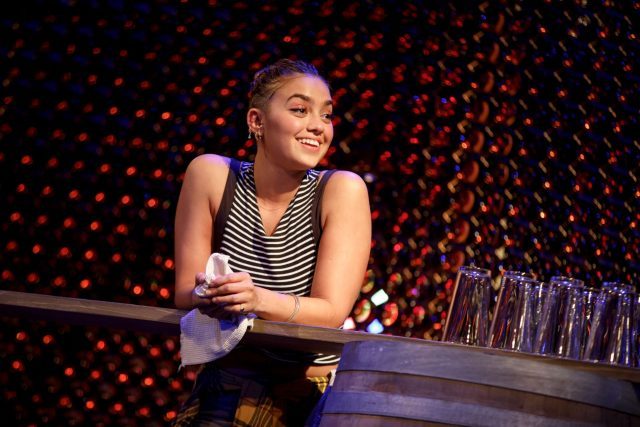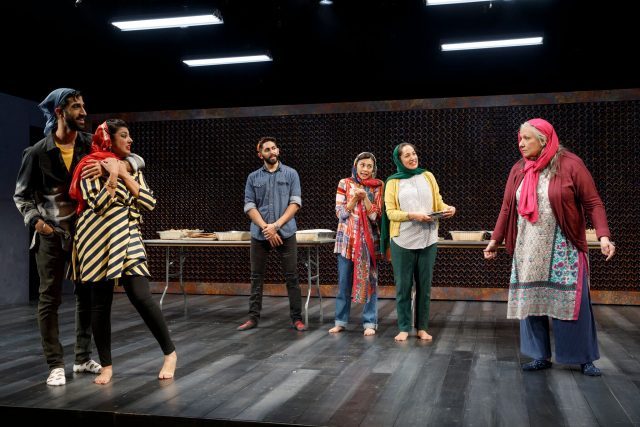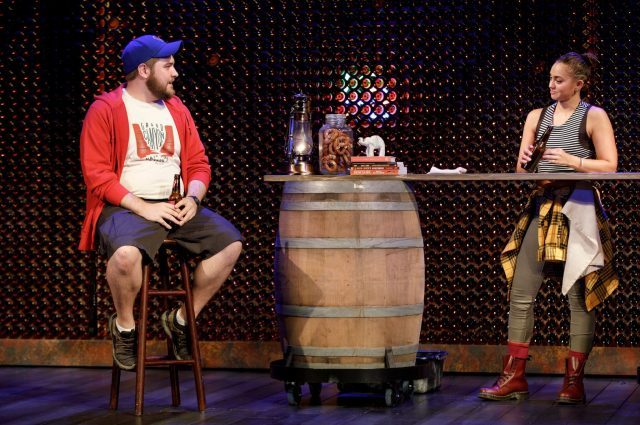
Basminder “Boz” Batra (Shazi Raja) dreams of owning a bar in Madison, Wisconsin, in Jaclyn Backhaus’s India Pale Ale (photo by Joan Marcus)
Manhattan Theatre Club
MTC at New York City Center – Stage I
Tuesday – Sunday through November 18, $69-$89
212-581-1212
indiapalealeplay.com
www.manhattantheatreclub.com
Jaclyn Backhaus’s India Pale Ale takes on even greater meaning in the wake of the synagogue shooting that left eleven Jewish worshipers dead in Pittsburgh on October 27. Her follow-up to Men on Boats, which was about an 1869 expedition to the Grand Canyon, India Pale Ale, a Manhattan Theatre Club production that opened last week at City Center, shuttles between the current day in Raymond, Wisconsin, and a pirate ship traveling from Calcutta to England in 1823. Desperate to try something new, twenty-nine-year-old Basminder “Boz” Batra (Shazi Raja) is secretly planning on leaving her extremely close Punjabi community to open a bar in Madison, Wisconsin, near the college. She dreams of being like one of her ancestors, Brownbeard (Alok Tewari), a wild pirate and explorer who led a mutiny of an East India Company ship two centuries before. “His cargo was beer / as mine’ll be! / In my bar / in Madison, Wisconsin,” she declares in a pirate accent. “Aye, the lineage is full circle now. / Oim leaving home to see the world. / The world in this yar instance: / a bar that sells alcoholic drinks / in a place that is not here.” Boz, who recently broke off an engagement with Vishal Singh (Nik Sadhnani), has not yet told her rather traditional parents, Deepa (Purva Bedi) and Sunny (Tewari), or her younger brother, Iggy (Sathya Sridharan), who is engaged to Lovi (Lipica Shah), about the bar. Deepa actually finds out about Boz’s plans from her gossipy cousin, Simran Rayat (Angel Desai). Overseeing it all is the family matriarch, Sunny’s mother, Dadi Parminder (Sophia Mahmud), who imparts wisdom as necessary.

The Batra family prepares for langar following horrific tragedy in India Pale Ale (photo by Joan Marcus)
A year later, Boz is tending bar with only one patron, who she finds out is the lonely Tim (Nate Miller), described in the script as “just so white it’s honestly painful.” Tim is a stand-in for much of white society (and much of the City Center audience) when he assumes that Boz is an immigrant, not a second-generation American born and raised in Wisconsin, and she doesn’t make it easy for him to get out of the hole he keeps digging. “So like your family / what are they . . . like what are you / what are they / where are they from,” he says, stumbling over the words. She eventually decides to be friendly, as Tim seems to be harmless, not a dangerous bigot. It’s a powerful, critical scene that beautifully lays out what so much of the play is about. Their conversation is ultimately cut short when Vishal unexpectedly shows up to bring Boz back to Madison, as there’s been a terrible tragedy in their Sikh community. They return home, where the family is preparing langar, a traditional feast that will try to bring the community together following the awful event.

A scene between Tim (Nate Miller) and Basminder “Boz” Batra (Shazi Raja) plays a central role in Jaclyn Backhaus drama (photo by Joan Marcus)
Backhaus was inspired to write the play by the Muslim travel ban executive order Donald Trump signed as well as a real tragedy that took place in Oak Creek, Wisconsin, in 2012. The contemporary scenes are poignant, funny, and heartfelt, but Backhaus and director Will Davis spend too much time on Brownbeard and his dancing pirates. Neil Patel’s set switches from the spare langar hall, with chairs and tables brought in and out, to the dark bar Boz runs, to a disco-like stage for the pirates; Arnulfo Maldonado has fun with the costumes, ranging from traditional Punjabi clothing to wild pirate apparel. Raja (Milk Like Sugar) excels as Boz, avoiding the stereotypical transitional figure that is found in so many plays involving a clash between the old and the new. She and Bedi (Dance Nation, An Ordinary Muslim) develop a wonderful rapport as the daughter-mother characters. The play is dragged down by late pedantic speeches by Deepa and Sunny that are wholly unnecessary, merely explaining what we’ve already seen. Otherwise, India Pale Ale is a compelling drama that offers new ways to look at shocking, all-too-real events that continue the hatred overwhelming America.